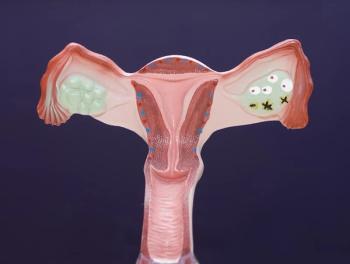
Miami Breast Cancer Conference® Abstracts Supplement
- 40th Annual Miami Breast Cancer Conference® - Abstracts
- Volume 37
- Issue suppl 4
- Pages: 31-32
44 Results From the Phase 1/2 Study of Patritumab Deruxtecan (HER3-DXd), a HER3-Directed Antibody-Drug Conjugate (ADC), in Patients (pts) With HER3- Expressing Metastatic Breast Cancer (MBC)
Background
Human epidermal growth factor receptor 3 (HER3) is overexpressed in many types of cancer, including 30%-50% of breast cancers (BCs):
- Overexpression of HER3 in BC is associated with poor prognosis.
- No HER3-directed therapies have been approved for the treatment of any cancer.
Patritumab deruxtecan (HER3-DXd) is an antibody-drug conjugate (ADC) with 3 components:
- A fully human anti-HER3 IgG1 mAb (patritumab) covalently linked to
- A topoisomerase I inhibitor payload (an exatecan derivative) via
- A tetrapeptide-based cleavable linker
U31402-A-J101 (NCT02980341/JapicCTI-163401) is an ongoing phase 1/2 study of HER3-DXd in patients with HER3-expressing metastatic breast cancer (mBC).
- Early data from the dose-escalation, dose-finding, and dose-expansion parts showed promising antitumor activity and a manageable safety profile in heavily pretreated patients.
Here, we report mature data across all study cohorts, providing consolidated data among patients with a range of BC subtypes.
Materials and Methods
U31402-A-J101 is a phase 1/2, multicenter, open-label, first-in-human study of HER3DXd in HER3-expressing advanced/ unresectable or mBC, including TNBC. Data were pooled for all 3 parts of the ongoing U31402-A-J101 study. Primary objectives included safety and efficacy.
Results
Median follow-up for all patients at data cutoff (August 16, 2021) was 31.9 mo (range,15-56 mo)
- Efficacy is reported by BC subtype: HR+/HER2− (n = 113), TNBC (n = 53), and HER2+ (n = 14).
- Safety is reported for patients who received HER3-DXd 4.8 mg/kg (n = 48), 6.4 mg/kg (n = 98), and all patients (N = 182a).
Patients with HER3-expressing mBC with poor prognostic characteristics were heavily pretreated. At 32 mo follow-up, almost all patients (97.8%) had discontinued treatment at the time of data cutoff. HER3-DXd demonstrated durable antitumor activity per blinded independent central review (BICR) across BC subtypes.
- Confirmed ORR for all patients (N = 182) was 28.6% (95% CI, 22.1%-35.7%), with a median DOR of 7.0 mo (95% CI, 5.5-8.5 mo).
HER3-DXd induced a clinically meaningful decrease in tumor size by BICR in most patients across BC subtypes. Antitumor responses by the best overall response (BOR) were observed across a broad range of pretreatment baseline HER3 membrane-expression levels. HER3 membrane expression changed dynamically, but this was not associated with clinical activity.
Conclusions
HER3-DXd demonstrated clinically meaningful and durable antitumor activity in a heavily pretreated population of patients with HER3-expressing BC.
- Durable antitumor activity was demonstrated across BC subtypes: HR+/HER2– (objective response rate [ORR], 30%; median duration of response (DOR), 7.2 months [mo]), triple-negative breast cancer (TNBC) (ORR, 23%; median DOR, 5.9 mo), and HER2+ (ORR, 43%; median DOR, 8.3 mo).
- Antitumor activity was also demonstrated across the range of HER3 expression.
The safety profile was manageable, with a low rate of discontinuation due to treatment-emergent adverse events (TEAEs) (10%).
- The rate of adjudicated treatment-related interstitial lung disease (ILD) was 7%; most cases were grades 1 and 2.
- Grade ≥3 hematological toxicities were manageable; no grade ≥3 thrombocytopenia resulted in treatment discontinuation nor in a grade ≥3 bleeding event.
As a similar safety profile was seen with 4.8 mg/kg and 6.4 mg/kg, a 5.6 mg/kg dose, currently used in non–small cell lung cancer, is being evaluated in BC to refine dose optimization. These data provide encouraging evidence of antitumor efficacy with a manageable safety profile and warrant further evaluation of HER3-DXd across clinical and histopathological BC subtypes.
AFFILIATIONS:
Ian E. Krop,1 Norikazu Masuda,2 Toru Mukohara,3 Shunji Takahashi,4 Takahiro Nakayama,5 Kenichi Inoue,6 Hiroji Iwata,7 Tatsuya Toyama,8 Yutaka Yamamoto,9 Damien Hansra,10 Masato Takahashi,11 Akihiko Osaki,12 Kumiko Koyama,13 Tatsuya Inoue,14 Takatoshi Yonekura,13 Joseph Mostillo,15 Shoichi Ohwada,13 Yoshimi Tanaka,13 David Sternberg,15 Kan Yonemori16
1Yale Cancer Center, New Haven, CT.
2Nagoya University Graduate School of Medicine, Nagoya, Japan.
3National Cancer Center Hospital East, Kashiwa, Japan.
4The Cancer Institute Hospital of Japanese Foundation for Cancer Research, Tokyo, Japan.
5Osaka International Cancer Institute, Osaka, Japan.
6Saitama Cancer Center, Saitama Japan.
7Aichi Cancer Center Hospital, Nagoya, Japan.
8Nagoya City University, Nagoya, Japan.
9Kumamoto University Hospital, Kumamoto, Japan.
10Piedmont Physicians Medical Oncology, Fayetteville, GA.
11National Hospital Organization, Hokkaido Cancer Center, Sapporo, Japan.
12Saitama Medical University International Medical Center; Hidaka, Japan.
13Daiichi Sankyo Co, Ltd., Tokyo, Japan.
14Daiichi Sankyo RD Novare Co, Ltd., Tokyo, Japan.
15Daiichi Sankyo, Inc, Basking Ridge, NJ.
16National Cancer Center Hospital, Tokyo, Japan.
Articles in this issue
Newsletter
Stay up to date on recent advances in the multidisciplinary approach to cancer.






































